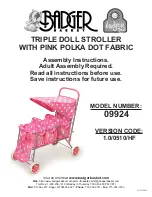
Accessory 11E
Hardware Setup
4
E16-E21*: Sinking or Sourcing Output Select
Jumpers Descriptions
E16 & E17
Sinking inputs with the ULN2803A IC for outputs 25 through 32
2-3 Sourcing outputs with the UDN2981A IC for outputs 25 through 32
E18 & E19
1-2 Sinking inputs with the ULN2803A IC for outputs 33 through 40
2-3 Sourcing outputs with the UDN2981A IC for outputs 33 through 40
E20 & E21
1-2 Sinking inputs with the ULN2803A IC for outputs 41 through 48
2-3 Sourcing outputs with the UDN2981A IC for outputs 41 through 48
* Set by factory
Hardware Address Limitations
The ACC-11E has a hardware address limitation relative to the newer series of UMAC high-
speed IO cards. The new IO cards have four addresses per chip select (CS10, CS12, CS14, and
CS16). This enables these cards to have up to 16 different addresses. The ACC-9E, ACC-10E,
ACC-11E, and ACC-12E all have one address per chip select but also have the low-byte, middle-
byte, and high-byte type of addressing scheme and allows for a maximum of twelve of these IO
cards.
UMAC Card Types
UMAC CARD
Number of
Addresses
Category Maximum
# of cards
Card Type
ACC-9E, ACC-10E
ACC-11E, ACC-12E
4 General
IO
12 A
ACC-65E, ACC-66E
ACC-67E, ACC-68E
ACC-14E
16 General
IO 16
B
ACC-28E, ACC-36E
ACC-59E
16
ADC and DAC
16
B
ACC-53E, ACC-57E
ACC-58E
16 Feedback
Devices 16
B
Chip Select Addresses
Chip
Select
UMAC Turbo
Type A Card
MACRO
Type A Card
UMAC Turbo
Type B Card
MACRO
Type B Card
10
$078C00
$FFE0 or $8800
$078C00, $079C00
$07AC00, $07BC00
$8800,$9800
$A800,$B800
12
$078D00
$FFE8 or $8840
$078D00, $079D00
$07AD00, $07BD00
$8840,$9840
$A840,$B840
14
$078E00
$FFF0 or $8880
$078E00, $079E00
$07AE00, $07EC00
$8880,$9880
$A880,$B880
16 $078F00 $88C0
$078F00,
$079F00
$07AF00, $07BF00
$88C0,$98C0
$A8C0,$B8C0
Addressing Conflicts
When just using only the type A UMAC cards or using only the type B UMAC cards in an
application, the user does not have to worry about potential addressing conflicts other than
making sure the individual cards are set to the addresses as specified in the manual.
If the user has both type A and type B UMAC cards in their rack they should be aware of the
possible addressing conflicts. If the customer is using the Type A card on a particular Chip Select
(CS10, CS12, CS14, or CS16) then they cannot use a Type B card with the same Chip Select
Artisan Technology Group - Quality Instrumentation ... Guaranteed | (888) 88-SOURCE | www.artisantg.com










































